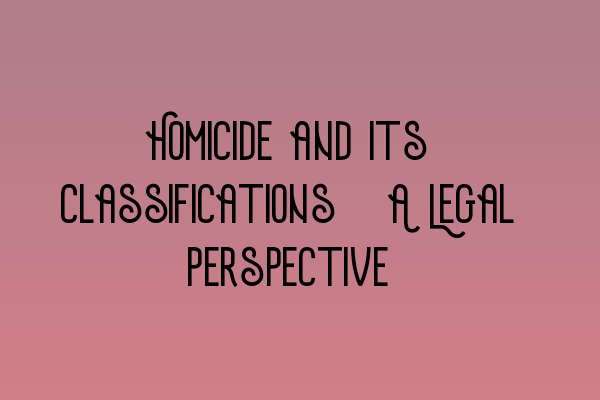Homicide and its Classifications: A Legal Perspective
When it comes to criminal law, one of the most serious offenses is homicide. Homicide refers to the unlawful killing of another human being, and it has different classifications based on the circumstances and intent behind the act. Understanding the classifications of homicide is essential for any legal professional working in the field of criminal law.
1. Murder
Murder is the most severe form of homicide, and it involves the intentional killing of another person with malice aforethought. Malice aforethought refers to the intent to cause death or serious bodily harm without legal justification or excuse. Murder can be further divided into first-degree murder and second-degree murder.
SQE 1 Practice Exam Questions and SQE 1 Practice Mocks FLK1 FLK2 can help you test your knowledge on murder laws and related topics.
2. Manslaughter
Manslaughter, on the other hand, is the unlawful killing of another person without malice aforethought. Unlike murder, manslaughter is typically the result of an intentional act with mitigating circumstances that reduce the culpability of the offender. Manslaughter can be categorized into voluntary manslaughter and involuntary manslaughter.
For detailed information on manslaughter, you can refer to SQE 2 Preparation Courses which cover this topic extensively.
3. Infanticide
Infanticide is a specific form of homicide that involves the killing of a newborn child by the child’s mother. It is typically considered a separate offense from murder or manslaughter due to the unique circumstances surrounding the crime. Infanticide laws, punishments, and defenses vary by jurisdiction, so it’s important to consult local legislation and legal resources for accurate information.
4. Felony Murder
Felony murder is a legal theory that holds a person responsible for any death that occurs during the commission of a dangerous felony, even if the person did not directly cause the death or have the intent to kill. This means that if someone dies as a result of a felony, such as robbery or arson, all individuals involved can be charged with felony murder.
If you are interested in learning more about felony murder and other criminal law concepts, SQE 1 Preparation Courses can provide comprehensive study materials.
Conclusion
Homicide encompasses a range of offenses, each with its own unique characteristics and legal implications. Understanding the classifications of homicide is crucial for criminal law practitioners to ensure accurate legal representation and to pursue justice effectively.
For more information about SRA SQE exam dates and other legal topics, refer to the SRA SQE Exam Dates page on our website.
Disclaimer: This blog post is for informational purposes only and should not be construed as legal advice. If you require legal assistance, please consult a qualified professional.
